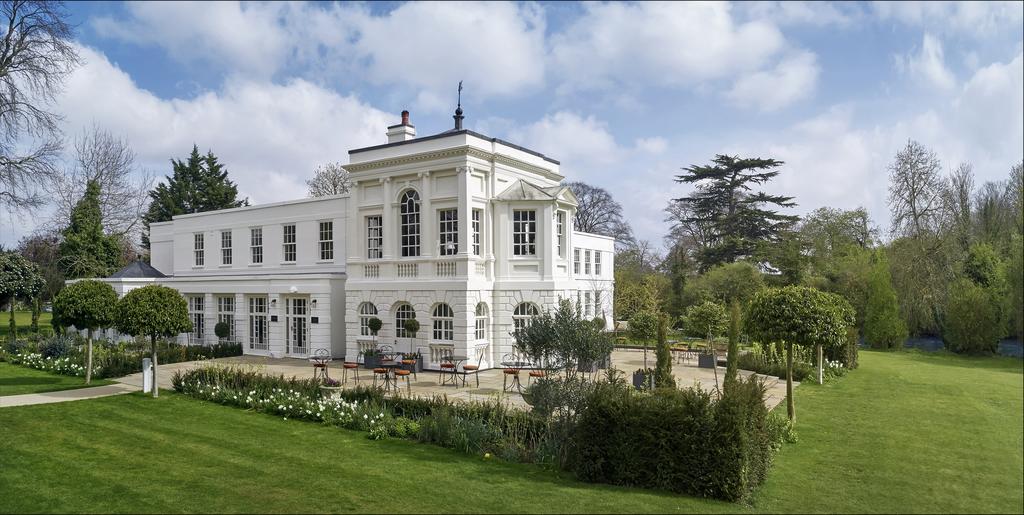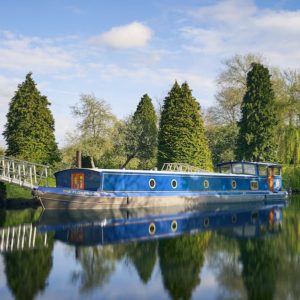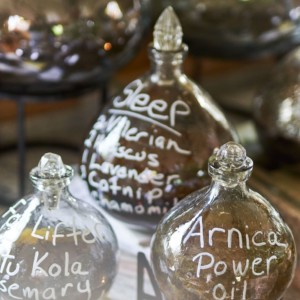
Monkey Island Estate. Just the name conjures fantasy and whimsy.
Indeed, there’s a fairy-tale quality about Monkey Island Estate, a new five-star hotel in rural England. Clearly, any label that alludes to simians captures the attention. But, a parcel of land set on seven acres amid a rural portion of the Thames with monkeys? That boggles the mind. In truth, no monkeys scamper along the island’s shores or hang from its trees. There’s no beach; not one coconut palm or banana tree, either. Instead, this sophisticated haven, accessible only by boat or footbridge, with a garden, an aviary, a chicken coop, a moored canal vessel that serves as spa, two Georgian structures, and endless lawns exudes something better—palpable history. (Don’t be disappointed about the monkeys. You will find some sporty primates in gentleman’s garb, comically painted on a ceiling inside one of the great houses. They were the brainchild of an 18th-century duke, who used the island as his fishing retreat.)
As it turns out, Monkey Island, less than an hour from London, near Windsor Castle, was actually named for medieval monks, masters of the healing arts. They resided on this spate of water-surrounded land, then called Monk’s Eyot, tending their herb garden and making potions, elixirs, and tinctures from plants such as sage, basil, garlic, and lavender. As herbalists, they traded with an organization called The Worshipful Society of Apothecaries, a group that sounds as righteous as a sect, as much a championing force as the Knights of Templar. In fact, they are/were—essentially—the official guild or livery of pharmacists (not to be confused with the pepperers, who were the purveyors of spices for foods). Their coat of arms today still boasts enchanting golden unicorns and rhinoceroses, right from a storybook. Just as suggestive of magic, the worshipful ones grew their medicinal products in the Chelsea Physic Garden, a storied patch of plants that perseveres today. The dispenser of cures and healing products, they hawked their produce along the shores of the Thames, trading with Monkey Island’s monks and others in search of roots, syrups, and powders with salubrious benefits.
Monkey Island’s most fascinating aspect is its Floating Spa. In an expressive rendition of sense of place, it romanticizes the island’s history of monk-farmed botanicals and medicinals.
It’s a scene I envision as I walk through the estate’s garden, where the holy men sowed and tilled. I imagine the monks meandering toward the worshipful ones’ canal boat at the Physic Garden, baskets in hand, prepared to barter for what they didn’t grow themselves. I imagine the vessel wafting a melange of perfume; I see the produce in organized heaps on board. If I squint, I can almost be transported to another time. Today, the resort’s garden has a flower-filled verge but also grows herbs. There’s a wooden smokehouse on one side, and a grow house on the end, which the spa uses for its hand-crafted products. Like a dream, bygone times feel present at Monkey Island Estate.

I laud YTL group, the owners, who have a knack for spotting soulful places, re-envisioning them, and repackaging them for modern consumers in a contemporary, yet historically focused way. (They are also responsible for Bath’s Gainsborough Hotel & Spa). Their rendition of Monkey Island Estate dips into the monk’s tenure (the garden, for example, eggs from the chickens, plus cocktails made with monk’s recipes in mind). But, it also references the many centuries afterward, when the island served as a playground for bluebloods, naughty Eton school boys, abundant royals, and celebrities aplenty. At some point, Monkey Island fell into ruin, though Bray, perhaps Britain’s favorite gourmand village (it has three Michelin-starred restaurants) lies just steps away. At last YTL refurbished the island, showcasing its vivid gravitas and personality, ensuring it will become the United Kingdom’s most heralded new hotel.
For me, Monkey Island’s most fascinating aspect is its Floating Spa. In an expressive rendition of sense of place, it romanticizes the island’s history of monk-farmed botanicals and medicinals. Without being maudlin or trite, it presents a “monkish” theme that fits the site as snugly as a pair of the Queen’s perfect gloves. Cleverly designed by YTL’s spa consultant Melissa Mettler, the spa occupies a cobalt-colored, vintage-looking barge, moored on the shore near the garden. With just three treatment rooms, it can’t help but offer guests an intimate retreat. Its moody foyer takes me back in time, with such touches as carafes and amphora-style bottles, labeled in bygone-style letters, filled with house-made herbal elixirs, lining the shelves. I enter to feel the boat rocking like a gentle lullaby. That’s almost a spa treatment in itself.
 Do try some of the signature treatments. The Monk’s Elixir begins with a tasting of some medieval cures made by monks, spirits, like Benedictine, which have lasted over the centuries. Monk-ly anecdotes are shared as you sip. A massage, designed to incorporate the rhythm of the boat, finishes the experience. The Floating Massage, another specialty, uses an aqua cushion to simulate swimming or floating in water. Ginger, arnica, and rosemary oils unravel the knots and release trapped negative energy. I opt for the Garden Herbs & Magic Peat, an all-over body invigorator, which uses products by Moss of the Isles, a company which sources their therapeutic ingredients only from Ireland and Britain. My 90 minutes begins with an exfoliation of milled iris root (doesn’t this sound like something a frock-coated contemplative would craft in his abbey?). Next, the therapist applies a layer of argan oil and poppyseed lotion for extreme hydration. Finally, my face is cleansed with marigold oil, then slathered with organic black Irish peat from a blessed blog. The treatment ends with a rustic cake (it feels like something monks would eat) and my choice of the herbal elixirs from the old-fashioned bottles.
Do try some of the signature treatments. The Monk’s Elixir begins with a tasting of some medieval cures made by monks, spirits, like Benedictine, which have lasted over the centuries. Monk-ly anecdotes are shared as you sip. A massage, designed to incorporate the rhythm of the boat, finishes the experience. The Floating Massage, another specialty, uses an aqua cushion to simulate swimming or floating in water. Ginger, arnica, and rosemary oils unravel the knots and release trapped negative energy. I opt for the Garden Herbs & Magic Peat, an all-over body invigorator, which uses products by Moss of the Isles, a company which sources their therapeutic ingredients only from Ireland and Britain. My 90 minutes begins with an exfoliation of milled iris root (doesn’t this sound like something a frock-coated contemplative would craft in his abbey?). Next, the therapist applies a layer of argan oil and poppyseed lotion for extreme hydration. Finally, my face is cleansed with marigold oil, then slathered with organic black Irish peat from a blessed blog. The treatment ends with a rustic cake (it feels like something monks would eat) and my choice of the herbal elixirs from the old-fashioned bottles.
When I leave, I feel as renewed and revitalized as Monkey Island Estate itself. I might even feel as frisky as a monkey.
Becca Hensley
Becca Hensley is Editor at Large for Insider's Guide to Spas. Based in Austin, she writes regularly about travel and spas. She believes a good story draws you in like laughter in a crowded room, and challenges you to do it justice. Her work appears regularly in Austin Monthly, Travel Channel, Toronto Star and National Geographic Traveler.